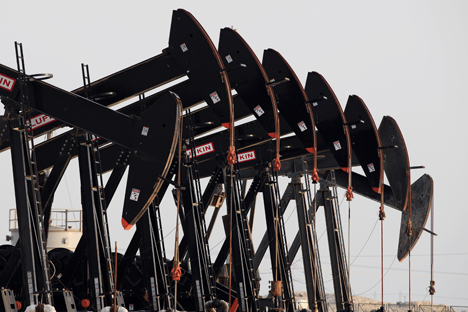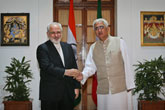Russia and Iran step up economic ties

The signing of the Russian-Iranian MoU has largely been made possible due to the aggravation of relations between Russia and the West. Source: AP
Russia and Iran signed a Memorandum of Understanding (MoU) for a period of 5 years, which initiates a sharp intensification of economic cooperation. The document lays the foundation for a comprehensive multi-billion dollar deal for trade in the oil sector between the two countries. But such activity towards Iran is shown not only by Russian companies, but also by their competitors from other countries, including those in the West.
“The memorandum provides for the expansion of trade and economic cooperation in the fields of construction and reconstruction of power generating capacity, the development of power grid infrastructure, the oil and gas sector, as well as the supply of machinery, equipment and consumer goods,” the Russian Ministry of Energy said. The ministry clarified that the specific contracts within these areas will be discussed in Tehran on September 9-10 at the meeting of the Intergovernmental Commission of the Russian Federation and Iran (which is co-chaired by the ministers of economy of both countries).
Oil in exchange for goods
The backbone of greater economic cooperation between Moscow and Tehran is the purchase of Iranian oil by Russia. Initially, the sides talked about very large quantities – up to 25 million tonnes per year, which is about a quarter of all Iranian oil. Now, according to the Kommersant, the sides have agreed to a more modest volume, in between 2.5-3 million tonnes per year. Iran will sell its oil slightly cheaper than the cost of Brent. The annual contract could reach $2.35 billion.
Even 3 million tonnes per year, which is 1.5 percent of Iran’s own production, is a significant amount, according to experts. Investkafe analyst Gregory Birge says this amount is equal to 10 percent of Russia’s oil exports to Asia-Pacific and 2 percent of its oil exports to EU countries. “For the oil market, it's a significant amount, especially if sanctions imposed against Russia in the future adversely affect the level of domestic production of oil,” said Birge. According to analysts, Russia may re-export the Iranian oil in raw form, or it can be processed and exported as petroleum products, or it can also be used in the domestic market.
The main problem with cooperation in the oil sector is finding a buyer that would import Iranian oil despite an embargo. Previously, Russia considered Belarus and Ukraine, where Russian companies have a processing capacity. But for political reasons, this possibility was abandoned. Now it is assumed that the main markets may be China and consumers in Africa (possibly South Africa).
In addition to crude oil, Iran can supply Russia with “petrochemicals, cement, carpets, processed fruits, and vegetables,” said the Russian ambassador to Tehran, Levan Dzhagaryan. The proceeds also mean Iran intends to buy products and services from Russia. According to the Iranian ambassador in Moscow Mehdi Sanai, Tehran is interested in purchasing Russian machinery, rails, heavy trucks, metals, and grains.
The agreement between the two countries also involves the participation of Russian companies in projects in Iran for the construction and reconstruction of power plants and networks. Therefore, according to the ambassador, Tehran is interested in Russia's participation in the electrification of its railway. Iran is also considering the possibility of purchasing several hundred megawatts of electricity from Russia. In addition, the ambassador said Tehran would welcome the launch of joint projects to create mini-refineries in Iran and develop gas fields there.
Sanctions have accelerated cooperation with Iran
According to analysts, the signing of the Russian-Iranian MoU has largely been made possible due to the aggravation of relations between Russia and the West. “Moscow has invested a lot of effort in finding a diplomatic solution to the Iranian nuclear issue and was ready to refrain from actions that could cause a sharp reaction from the United States. But the situation has changed, said PIR Centre expert Andrei Baklitsky. Russia is now much less interested in listening to the recommendations of the U.S. Moreover, Iran, whose importance to the West has greatly increased, in connection with the events in Iraq and the search for alternatives to Russian hydrocarbon, has received more freedom to manoeuvre. Furthermore, before, Moscow had to consider the threat of U.S. sanctions for violating the oil embargo against Iran; but now, when the Russian oil sector has also been hit by sanctions, this factor is given less importance.”
Another reason for the rapid implementation of Moscow’s plans in relation with Tehran – as experts are calling it – is the intensifying struggle to win the Iranian market. Since late last year, when the process of lifting sanctions against Iran began, representative business delegations from China, the UK, Germany, France, Italy, Austria, Sweden, and some other countries had already visited Tehran. A few days ago, Reuters and The Wall Street Journal, citing sources from German industrial companies, reported that because of the situation surrounding Ukraine and the U.S. and the EU-backed sanctions against Russia, German businesses could redirect their investments in the Russian economy to Iran. The German Chamber of Commerce predicts, after sanctions against Tehran are further weakened, annual German exports to Iran will reach € 10 billion (in 2013 they amounted to € 1.85 billion).
First published in Russian by Kommersant.
All rights reserved by Rossiyskaya Gazeta.
Subscribe
to our newsletter!
Get the week's best stories straight to your inbox
.jpg)
